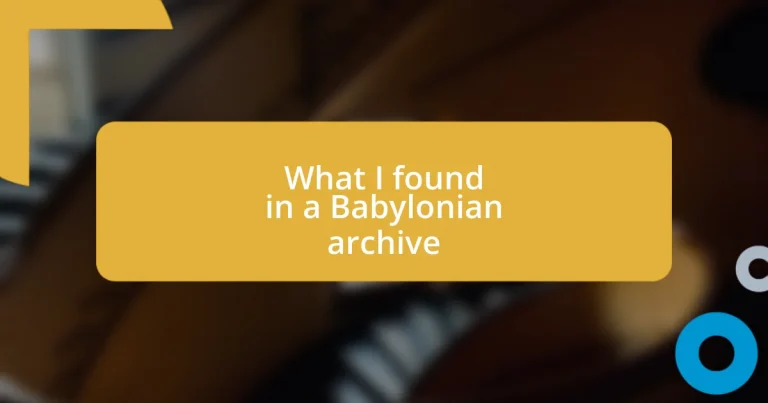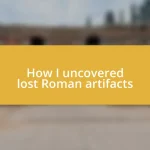Key takeaways:
- The Babylonian archives offer invaluable insights into ancient civilization, revealing their governance, culture, and early legal systems.
- Key discoveries include detailed commercial transactions, legal texts reflecting societal norms, and epic poetry that connects past beliefs to contemporary narratives.
- Accessing these archives, whether through physical collections or online databases, enhances understanding and fosters interdisciplinary collaboration in modern scholarship.
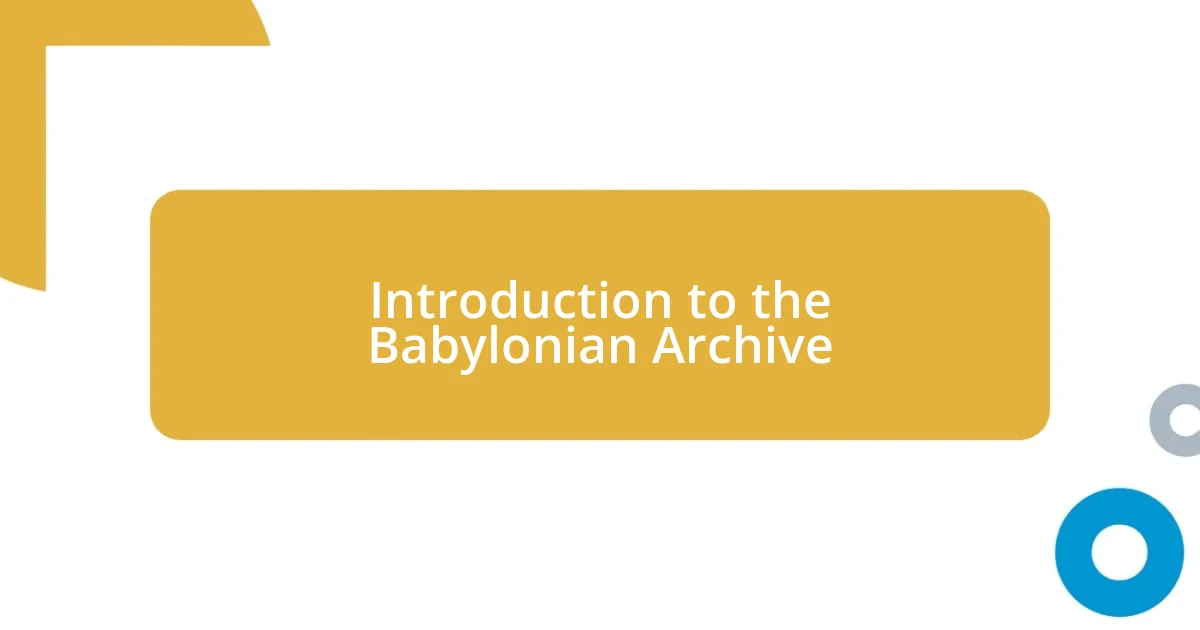
Introduction to the Babylonian Archive
The Babylonian archive is a treasure trove of ancient history that captures my imagination every time I think about it. From clay tablets filled with cuneiform inscriptions to records of everyday transactions, it provides a glimpse into a civilization that has shaped so much of what we know today. Have you ever wondered how something so old can still resonate with our modern lives?
As I delved into the archives, I was struck by the sheer diversity of documents found there. It’s fascinating to think that these tablets contain everything from legal codes to literary works, revealing the complexities of Babylonian society. When I read about their governance system or their views on education, I couldn’t help but feel a connection to those ancient people – their struggles, aspirations, and creativity echo through the ages.
Exploring the Babylonian archive is like stepping into a time machine. I remember the first moment I held a replica of a tablet, feeling the weight of history in my hands. It makes me ponder: what stories would these artifacts tell if they could speak? Each tablet opens up a world rich in culture and knowledge, urging us to look deeper and understand the threads that tie our past to our present.
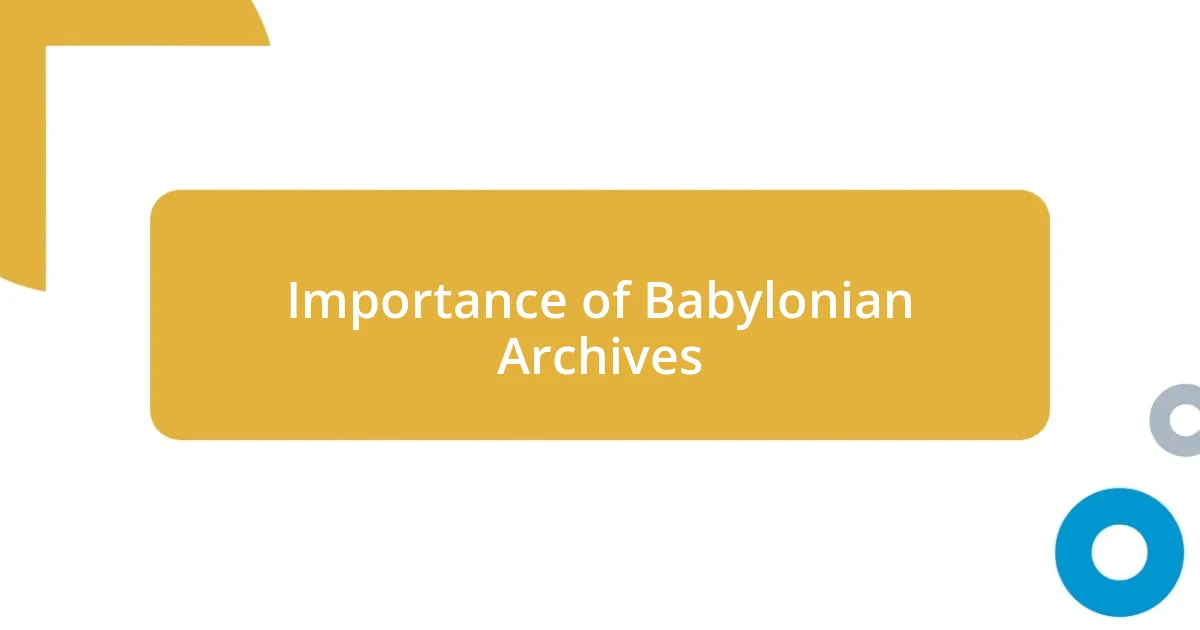
Importance of Babylonian Archives
The Babylonian archives hold immense significance as they offer invaluable insights into one of the earliest civilizations known to mankind. Each clay tablet serves as a time capsule, preserving everything from administrative records to personal letters. I remember flipping through some reproductions and feeling a heartbeat of history, realizing how these fragments depict the daily lives, beliefs, and governance of the Babylonians.
Understanding the importance of Babylonian archives is essential for several reasons:
- They provide historical context for modern legal systems and administrative practices.
- They illuminate the culture, economy, and social structure of ancient civilizations.
- They help us appreciate the evolution of language and writing systems.
- They offer clues about early scientific and mathematical knowledge.
This deep connection to our roots is what makes the Babylonian archives truly extraordinary. Each document isn’t just ink on clay; it’s a testament to human thought and society. Exploring these archives evokes a sense of wonder, making one feel like a bridge between past and present.
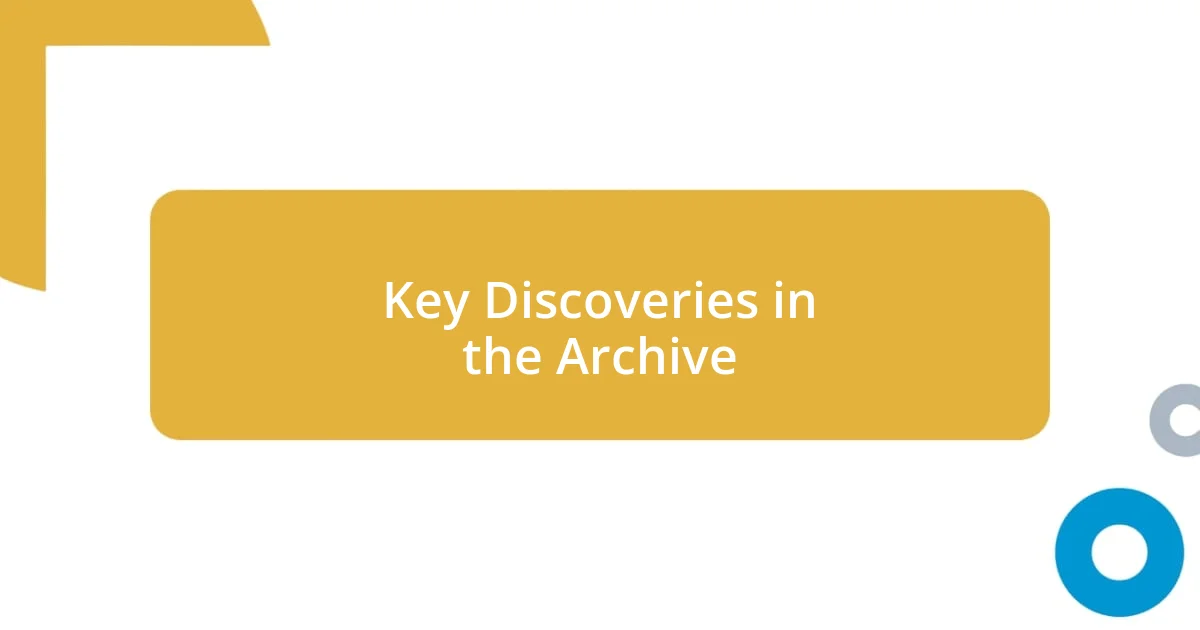
Key Discoveries in the Archive
The Babylonian archive reveals remarkable insights, particularly in economics and trade. Among the most intriguing discoveries are the detailed records of commercial transactions on clay tablets. I recall the excitement I felt when reading through these transactions. It’s almost like walking through a bustling bazaar, feeling the energy of merchants negotiating deals, reflecting the complex economic systems they had in place. These fragments show us that the Babylonians were not just ancient people; they were savvy traders and shrewd business people who laid the groundwork for modern commerce.
Another key area of discovery lies within their legal texts. I was genuinely fascinated to encounter legal codes that anyone could recognize as early forms of justice systems. The concept of contracts and property rights seemed so advanced for their time. It’s so easy to imagine how these laws impacted daily life, impacting family and societal structure. Holding those tablets, I felt a strong sense of continuity in human experience—laws have evolved, but the fundamental struggle for justice transcends time and space.
Lastly, the literary works found in the archive drew me in, particularly the epic poetry. I remember feeling a chill as I read the stories that reflected their beliefs about gods and heroes. Their narratives carried themes of morality and destiny that still resonate today. Can you picture gathering around a fire, listening to tales of bravery and tragedy? It’s powerful to think that these stories have echoed through millennia, still finding relevance in our lives.
| Key Discoveries | Description |
|---|---|
| Commercial Transactions | Records of goods traded, showcasing the complexity of Babylonian economy. |
| Legal Texts | Early forms of legal codes reflecting societal norms and justice. |
| Epic Poetry | Narratives that reveal beliefs about gods, morality, and human experience. |

Analysis of Textual Findings
When analyzing the textual findings from the Babylonian archive, I can’t help but marvel at how these clay tablets reflect the mindset of a civilization. For instance, the meticulous nature of commercial records speaks volumes about their societal values. I felt a rush of admiration realizing that the Babylonians not only engaged in trade but also embraced transparency and accountability in their transactions. Isn’t it fascinating that such principles were in play thousands of years ago?
Delving into the legal texts, I was struck by the sophistication of their justice system. Reading through these laws, I found myself drawing parallels with modern legal principles, which made me ponder how much has changed—and how much has remained the same. I recall one particular tablet detailing a contract that was remarkably similar to agreements we might draft today. It made me think: after all these centuries, how do we continue to navigate rights and obligations in our lives?
The literary works were perhaps the most enthralling of all. As I examined the epic poetry, I felt a unique connection to the emotions of those who lived in ancient Babylon. The way they expressed their fears, hopes, and morality reminded me of contemporary storytellers. It’s almost as if I could hear their voices echoing through time, urging us to acknowledge our shared human experience. Have you ever felt that a story was meant for you, transcending centuries? That was my exact sentiment when engaged with these timeless narratives.
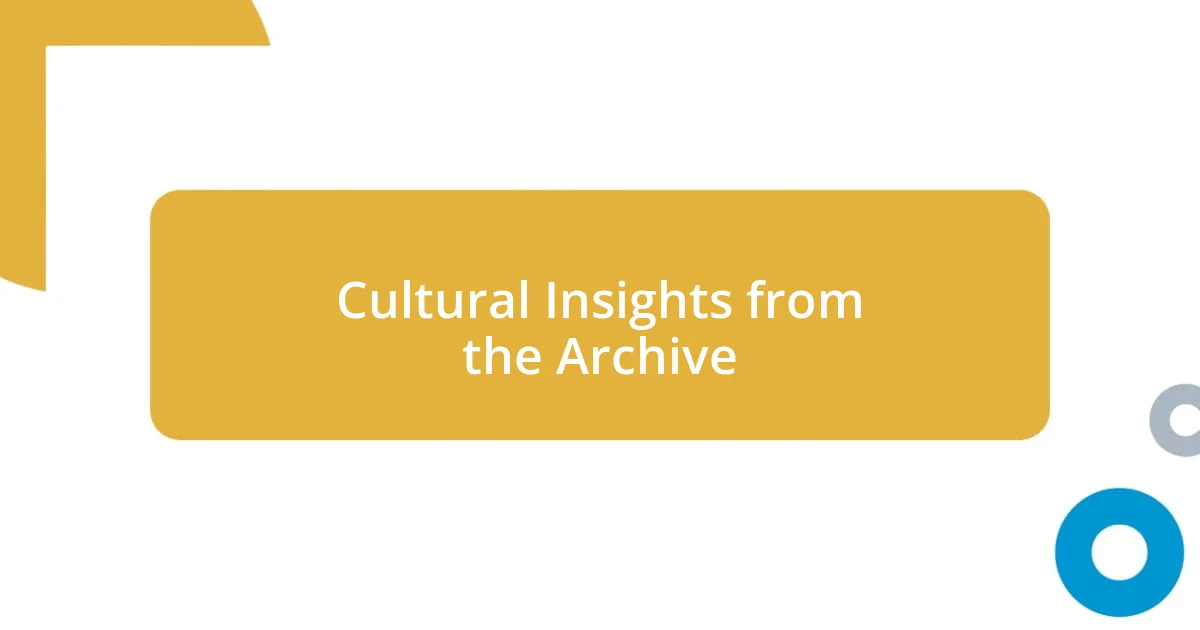
Cultural Insights from the Archive
The cultural insights drawn from the Babylonian archive are nothing short of astonishing. One moment stands out vividly in my mind: as I sifted through the tablets, I stumbled upon a record of a community feast. The sheer joy of those gatherings comes to life through the meticulous details—who attended, what was served, and even the songs that were sung. It made me reflect on how similar traditions still bind us today. Have you ever thought about how shared meals shape relationships? This archival glimpse made me appreciate the timeless bonds people forge over food and celebration.
Equally captivating were the insights into education and knowledge-sharing. I found a tablet that detailed lessons taught to young scribes, emphasizing the importance of literacy in their society. I recall an overwhelming sense of nostalgia, reminiscent of my own days in school, grappling with hefty textbooks and eager to learn. It sparked a question in my mind: how much has our thirst for knowledge evolved? The undeniable yearning for understanding, whether in ancient Babylon or today, connects us across time.
The archive also unveiled artistic expressions, particularly through inscriptions that adorned public spaces. I was deeply moved by one inscription that celebrated a local hero, making me ponder the influence of storytelling in forging collective identity. Can you imagine how stories of valor would unite a community? It’s incredible to think that even thousands of years ago, the Babylonians understood the power of narrative in shaping their cultural legacy, a lesson we can still draw from in our storytelling today.

Implications for Modern Scholarship
The implications of the Babylonian archive for modern scholarship are profound and far-reaching. As I explored the intricacies of ancient administrative practices, it became clear that the foundations of our own systems of governance and economics owe much to these early innovations. Reflecting on this, I found myself questioning how we can continue to learn from such legacies. What wisdom can we still apply to contemporary issues of governance or trade practices?
Moreover, the discovery of these vivid narratives challenges the traditional boundaries of history. I often wonder: how can we fully appreciate a civilization when we only scratch the surface of its cultural fabric? These texts encourage scholars to dive deeper, seeking connections and understanding not just through dates and events, but through the lived experiences and emotions of ancient peoples. They remind me that history is not merely a timeline; it’s a rich tapestry woven from stories, much like our own lives.
Finally, I believe these findings foster a collaborative spirit in academia. When I engage with colleagues about these texts, I see a spark of excitement that invites interdisciplinary discourse. How thrilling is it to unite fields like archaeology, literature, and anthropology to enrich our understanding? This collaborative effort broadens our perspectives and inspires innovative approaches to ancient studies, making the past ever more accessible and relevant to our present.
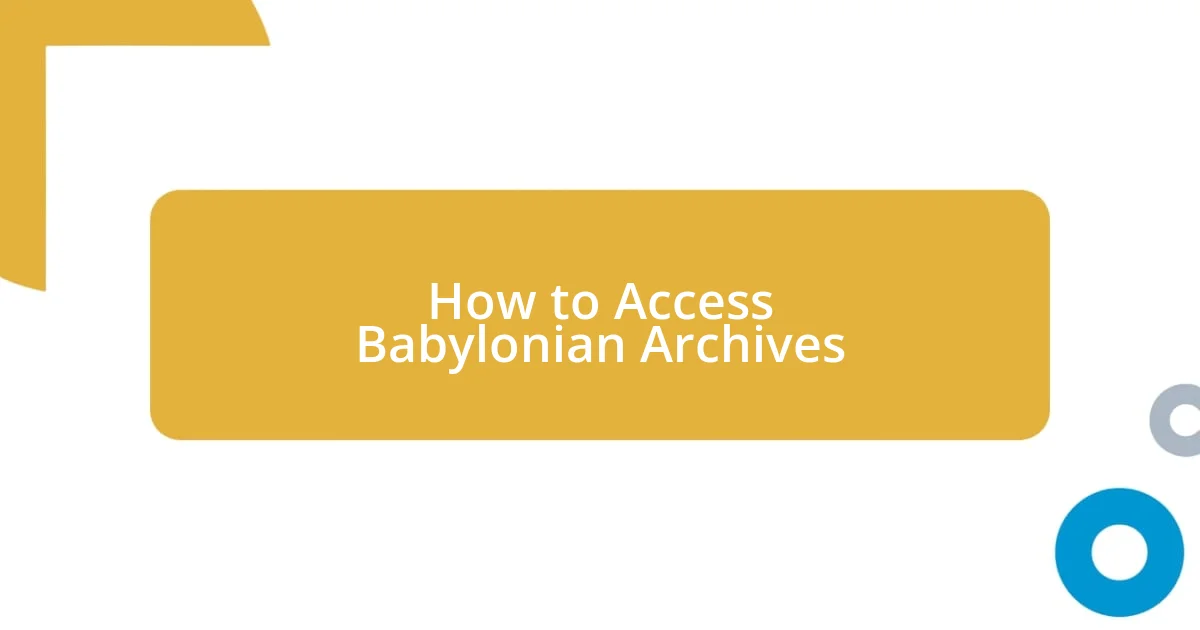
How to Access Babylonian Archives
Accessing Babylonian archives is an adventure in itself. Many of these archives are housed in major universities and museums worldwide, often with limited public access. I remember feeling a mixture of excitement and nervousness when I first approached a curator. Their enthusiasm and willingness to share knowledge reminded me how invaluable human connection is in unlocking hidden histories.
Online databases have also emerged, offering digitized collections of Babylonian texts. I often find myself lost in these virtual stacks, which can be both exhilarating and overwhelming. Have you ever popped into an archive just to browse and emerged with unexpected treasures? Accessing these archives online opens up opportunities for research that were once confined to physical locations, making ancient knowledge more accessible than ever.
Finally, collaborative research projects frequently yield fruitful access to these treasures, often requiring partnership with institutions or experienced scholars. I fondly recall my first team project, where seasoned archaeologists guided us through the intricacies of documenting findings. This mentorship not only enhanced my understanding but ignited a passion for pursuing knowledge within a community. Engaging with experts can create pathways that are otherwise hard to navigate alone.












